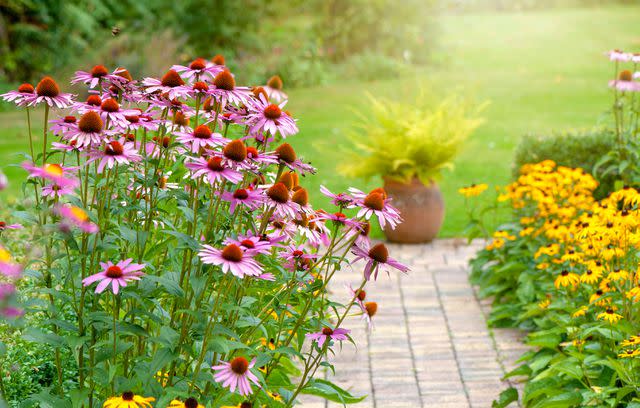10 Ways to Save Water Around the House (and Why It Matters)
The average family uses more than 300 gallons of water daily in the United States—here's how to reduce your usage.

Jenifer McNeil Baker
Water is one of the most precious natural resources on the planet, and it’s essential to sustaining life for humans, animals, and plants alike. Because water is a limited resource, it's important to use it wisely, saving as much as we can whenever we can. The average family in the United States uses more than 300 gallons of water a day at home. Reducing the amount of water we use is beneficial to the environment, helps reduce shortages, and saves the energy it takes to get water from the source to your faucet.
Fortunately, conserving water at home is easy, and taking small but thoughtful measures to reduce water consumption can make a big difference over time. We spoke to environmental specialists to find out the most effective ways to save water in your everyday routine, lowering your water bill and helping to keep the environment healthy at the same time.
Meet Our Expert
Kate Colarulli, head of strategic insights at CleanChoice Energy, a renewable energy company
David Todd, land and water use program manager, California Department of Water Resources
Julie Saare-Edmonds, senior environmental scientist, California Department of Water Resources
Related: 23 Simple Ways to Live Every Day More Sustainably
Fix Leaks
Not only do dripping faucets and other household leaks cause damage to your home, but they also needlessly waste quite a bit of water. "Take the time to make sure your pipes are all in working order," says Kate Colarulli, head of strategic insights at CleanChoice Energy. It’s not uncommon to experience leaks from a faucet or old toilet flapper, and it’s important to check outdoor irrigation systems and sprinklers, too.
"These types of leaks are often easy to fix, requiring only a few tools and hardware that can pay for itself in water savings," says Julie Saare-Edwards, senior environmental Scientist for the California State Department of Water Resources. "Fixing easily corrected household water leaks can produce savings that add up for homeowners on their water bills and prevent potential damage to the house."
Wash Full Loads of Laundry and Dishes
When it’s time to do laundry or run your dishwasher, always run a full load to cut down on water waste. "The average American family washes about 300 loads of laundry each year," says David Todd, land and water use program manager for the California State Department of Water Resources. "ENERGY STAR can help families cut their related energy and water costs. ENERGY STAR-certified clothes washers use about 25 percent less energy and 33 percent less water than regular washers," he says.
While running full dishwasher loads is the most efficient way to wash dishes, not everyone has a dishwasher. If you have to hand wash your dishes, be sure to plug your sink. "Plugging the sink and using the sink as a water basin saves the amount of water used when washing by hand," says Colarulli.
Related: 10 Ways to Make Laundry Day Better for the Environment
Go Native With Your Gardens

Jacky Parker Photography / Getty Images
Maintaining lawns and gardens often requires a lot of water, but choosing plants that are native to your area can help cut down water use. "Native grasses and plants require less water and fewer nutrients and fertilizers to keep them flourishing," says Colarulli. "Native plants also provide vital habitat for wildlife and pollinators, promoting a healthy ecosystem in your area." Taking the time to research which plants are native to your region can make a big impact in reducing your water consumption in the long run.
Related: 17 Sustainable Ways to Make Your Garden More Eco-Friendly
Choose One Glass Per Day
It’s essential to stay hydrated, but using several different drinking glasses throughout the day can fill up our dishwasher fast. "Designate one glass for drinking water per day or use a refillable water bottle to reduce the number of dishes that need to be washed," says Saare-Edwards. Just imagine how many dishwasher loads you can save in a month!
Get an Early Start With Your Lawn
In households across the United States, one-third of water usage can be attributed to caring for lawns and gardens, which translates to a staggering 9 billion gallons of water per day. If you still have a traditional grass lawn, cut down on water usage by getting an early start. "Water earlier in the morning so that more water is absorbed and less water evaporates in the heat," says Colarulli. She also suggests installing a smart sprinkler system that can adjust based on weather and soil saturation, saving water and money over time.
Related: 12 Alternatives to a Traditional Grass Lawn—and Why You Should Consider Making the Switch
Take Shorter Showers

Jenifer McNeil Baker
Whether you prefer morning or night showers, they are often a daily ritual—and one of the primary sources of water use in households. "Every time you take a shower, you also use energy to heat the water to your shower head," says Todd.
Reducing your time in the shower can make a big difference in your daily water consumption, but replacing your old shower head with a WaterSense-labeled model can help even more. "By replacing just one shower head with a WaterSense-labeled model, EPA estimates the average family can save 2,700 gallons of water and the energy required to heat it," says Todd.
Recycle Leftover Water
Between forgetting about a half-empty glass of water on the counter or changing out the water in your dog’s bowl, we all find ourselves faced with leftover water from time to time. But don’t pour it down the drain! "Recycle it instead and water your plants or use it to flush the toilet," says Todd. These seemingly small changes add up to make a big difference.
Enjoy Meat-Free Meals

Justin Walker
Even if you’re not vegan or vegetarian, incorporating meat-free meals into your weekly rotation can save a surprising amount of water. "One pound of beef can take up to 4,000 gallons of water to produce," says Colarulli. "In comparison, one pound of vegetables only requires 39 gallons of water." Try making a hearty bean soup or stir fry one night a week to start.
Related: How to Eat Less Meat (Without Missing It)
Add Mulch to Your Garden
Mulch isn’t just a way to make your garden look pretty. It’s also an effective way to help save water. "Use mulch around trees and shrubs (away from the stem or trunk) to keep the soil cool and moist," says Todd. Soil left in the open dries out much faster, meaning you’ll have to water it far more often. Though mulch may cost you money upfront, you’ll save big on your water bill, especially if you have a sizable yard.
Turn Off the Water When Brushing Your Teeth
It may seem obvious, but so many people still forget to turn off the water while brushing their teeth. "Turning off the tap while brushing your teeth can save 8 gallons of water per day," says Saare-Edwards. "Assuming you brush your teeth twice daily, you could save nearly 2,920 gallons per year." That’s just for one person– imagine the impact a family of four could make implementing this easy practice.
"It takes a surprising amount of energy to pump, heat, treat, and move water," adds Colarulli. "Simple steps such as turning the faucet off when brushing your teeth, or taking shorter showers can add up and save a lot of water."
Read the original article on Martha Stewart.

